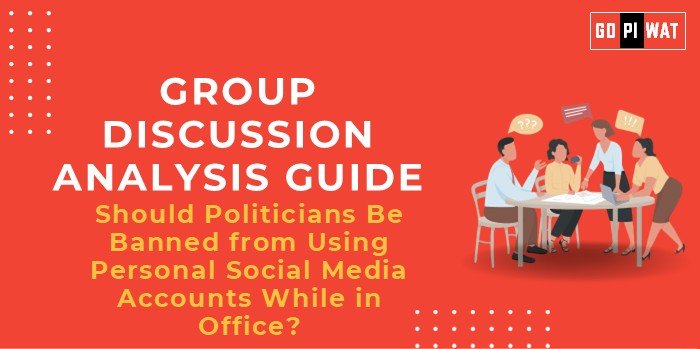📋 Group Discussion Analysis Guide
Should Politicians Be Banned from Using Personal Social Media Accounts While in Office?
🌐 Introduction to the Topic
Context: Social media has become a powerful platform for political communication. Politicians often use personal accounts to connect directly with the public, bypassing traditional media. However, concerns about misinformation, transparency, and misuse of influence raise questions about whether such use should be restricted.
Background: High-profile controversies, such as the misuse of personal social media accounts for propaganda or unverified claims, have intensified debates globally.
📊 Quick Facts and Key Statistics
- Social Media Reach: 4.9 billion global users in 2023, making it a primary communication channel.
- Trust in Social Media: Only 37% of people globally trust political information on social platforms (Edelman Trust Barometer, 2024).
- Incidents of Misinformation: Over 70% of flagged political misinformation originates from personal accounts (FactCheck.org, 2023).
- Global Policy Trends: Countries like Germany and Singapore have introduced stricter regulations for politicians’ digital communication.
👥 Stakeholders and Their Roles
- Government Bodies: Regulate transparency and enforce ethical guidelines.
- Politicians: Engage with the electorate and share updates.
- Citizens: Consume and react to political communication, influencing public sentiment.
- Social Media Platforms: Moderate content and provide transparency tools.
- Media Organizations: Act as intermediaries and fact-checkers.
🎯 Achievements and Challenges
✅ Achievements:
- Direct Citizen Engagement: Politicians reach millions instantly.
- Transparency in Governance: Policy updates and real-time announcements on social media.
- Crisis Management: Effective communication during emergencies.
- Campaigning Innovation: Personal branding and fundraising opportunities.
⚠️ Challenges:
- Misinformation Spread: High-profile cases of politicians sharing false information.
- Blurred Boundaries: Mixing personal opinions with official roles.
- Polarization: Amplification of divisive content.
- Lack of Accountability: Personal accounts often bypass institutional checks.
🌍 Global Comparisons:
- Success: New Zealand’s policy of voluntary restraint by ministers.
- Challenges: The US faces regular controversies over inflammatory tweets by politicians.
📋 Structured Arguments for Discussion
- Supporting Stance: “Banning personal accounts ensures politicians remain professional and accountable, reducing misinformation risks.”
- Opposing Stance: “Restricting personal accounts infringes on free speech and limits politicians’ ability to connect with citizens authentically.”
- Balanced Perspective: “While personal accounts allow for authentic interaction, regulations should ensure transparency and accountability.”
🗣️ Effective Discussion Approaches
- Opening Approaches:
- “Over 70% of political misinformation originates from personal accounts, raising concerns about their unregulated use.”
- “While social media empowers citizen engagement, its misuse undermines electoral integrity, necessitating balanced interventions.”
- Counter-Argument Handling:
- Acknowledge free speech concerns but highlight ethical governance.
- Propose regulated use rather than outright bans.
📈 Strategic Analysis of Strengths and Weaknesses
- Strengths: Direct communication, rapid information dissemination.
- Weaknesses: Unverified claims, lack of professional oversight.
- Opportunities: Strengthened regulations, official account emphasis.
- Threats: Erosion of trust, political polarization.
📚 Connecting with B-School Applications
- Real-World Applications: Topics like crisis communication, digital marketing ethics, and leadership accountability.
- Sample Questions:
- “Should personal freedom be sacrificed for professional accountability?”
- “How can governments ensure ethical digital communication?”
- Insights for Students: Explore strategies to balance personal branding and ethical leadership in governance.


